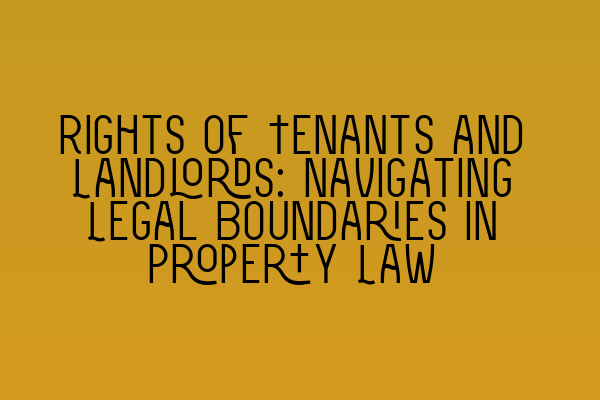Rights of Tenants and Landlords: Navigating Legal Boundaries in Property Law
Renting a property can be an exciting and convenient way to find a home or establish a business. However, it is essential for both tenants and landlords to understand their rights and responsibilities to ensure a harmonious and legally compliant tenancy arrangement. In this blog post, we will explore the rights of tenants and landlords, and how they can navigate the legal boundaries in property law.
1. Understanding the Tenancy Agreement
The tenancy agreement is a legally binding document that outlines the rights and obligations of both the tenant and the landlord. It is crucial for both parties to carefully review and understand the terms of the agreement before signing it. This document will cover important aspects such as the duration of the tenancy, rent payment details, and maintenance responsibilities.
2. Security of Tenure
One of the primary rights of tenants is security of tenure. This means that tenants have the right to remain in the property as long as they comply with the terms of the tenancy agreement. However, landlords may have grounds for eviction in certain circumstances, such as non-payment of rent or breach of other terms outlined in the agreement.
3. Rent and Rent Increases
Tenants have the right to know the amount of rent they should pay, as well as the frequency and method of payment. Landlords must provide tenants with proper notice if they intend to increase the rent during the tenancy. It is important to note that any rent increase should be in line with legal requirements, and tenants have the right to challenge unfair increases.
4. Repairs and Maintenance
Landlords have the responsibility to ensure that the rented property is maintained and in a habitable condition. This includes addressing necessary repairs and ensuring the property meets minimum health and safety standards. Tenants should promptly report any issues or damages to the landlord, who must then take appropriate action to resolve them.
5. Deposit Protection
When renting a property, tenants are often required to provide a security deposit. Landlords have a legal obligation to protect this deposit in a government-approved tenancy deposit scheme. This ensures that the deposit is returned to the tenant at the end of the tenancy, minus any deductions for damages or outstanding rent.
6. Right to Privacy
Tenants have the right to enjoy their rented property in peace and privacy. Landlords should respect this right and provide reasonable notice before entering the property for inspections or repairs, except in cases of emergency. Similarly, tenants should also respect the property and not engage in any activities that may cause nuisance or disruption to neighbors.
7. Ending the Tenancy
Both tenants and landlords have specific procedures to follow when ending a tenancy. This may involve giving notice in writing, adhering to the notice period specified in the tenancy agreement or statutory guidelines, and conducting proper inventory checks. Failure to follow the correct procedures may result in legal disputes or financial penalties.
Navigating these legal boundaries can be complex, and it is advisable for both tenants and landlords to seek professional assistance to ensure compliance with property law. Solicitors specialized in property law can provide valuable guidance and support throughout the tenancy process.
In conclusion, understanding the rights and responsibilities of tenants and landlords is crucial for maintaining a successful tenancy arrangement. By familiarizing themselves with the tenancy agreement, rent regulations, repair responsibilities, and other legal requirements, both parties can navigate the legal boundaries to ensure a smooth and positive experience. If you require expert advice, consult a reputable solicitor specializing in property law to ensure a fair and legally compliant tenancy.
For more information related to SQE preparation, practice exams, and upcoming exam dates, check out the following articles:
– SQE 1 Practice Exam Questions
– SQE 1 Practice Mocks FLK1 FLK2
– SQE 2 Preparation Courses
– SQE 1 Preparation Courses
– SRA SQE Exam Dates
